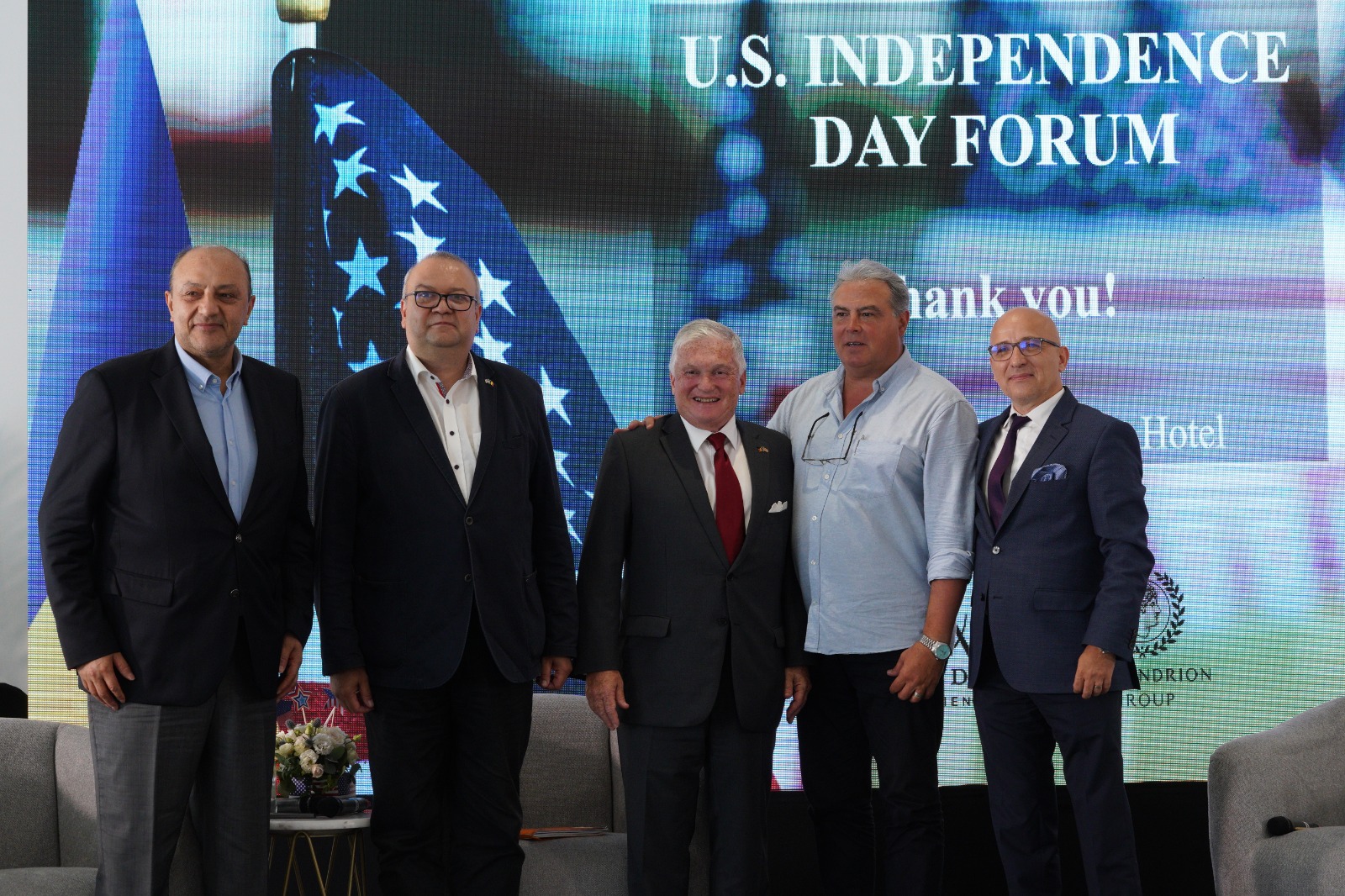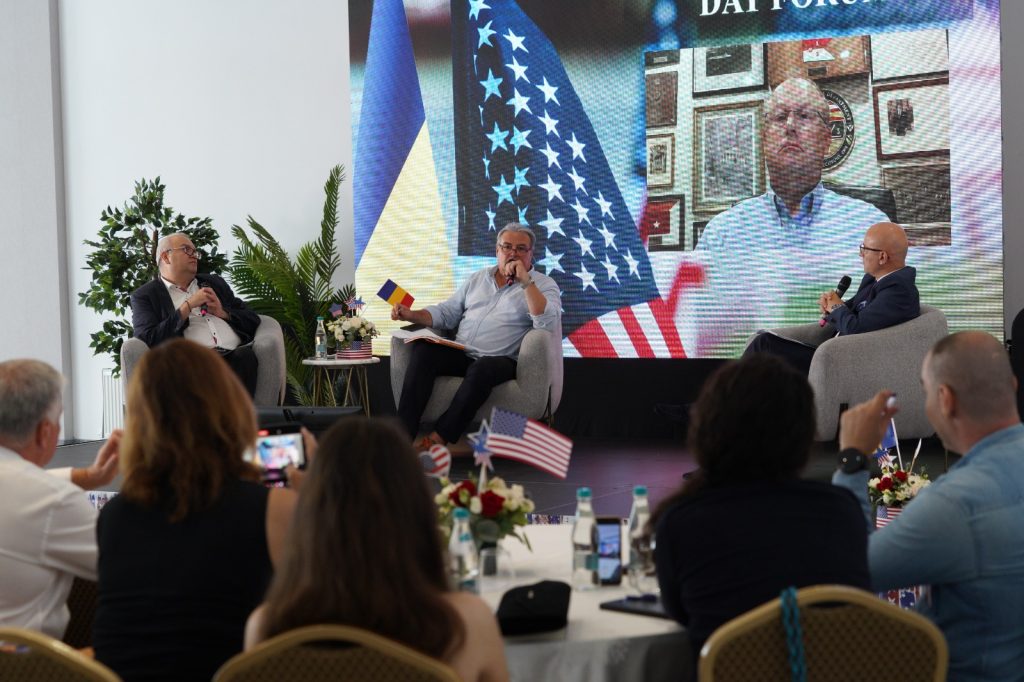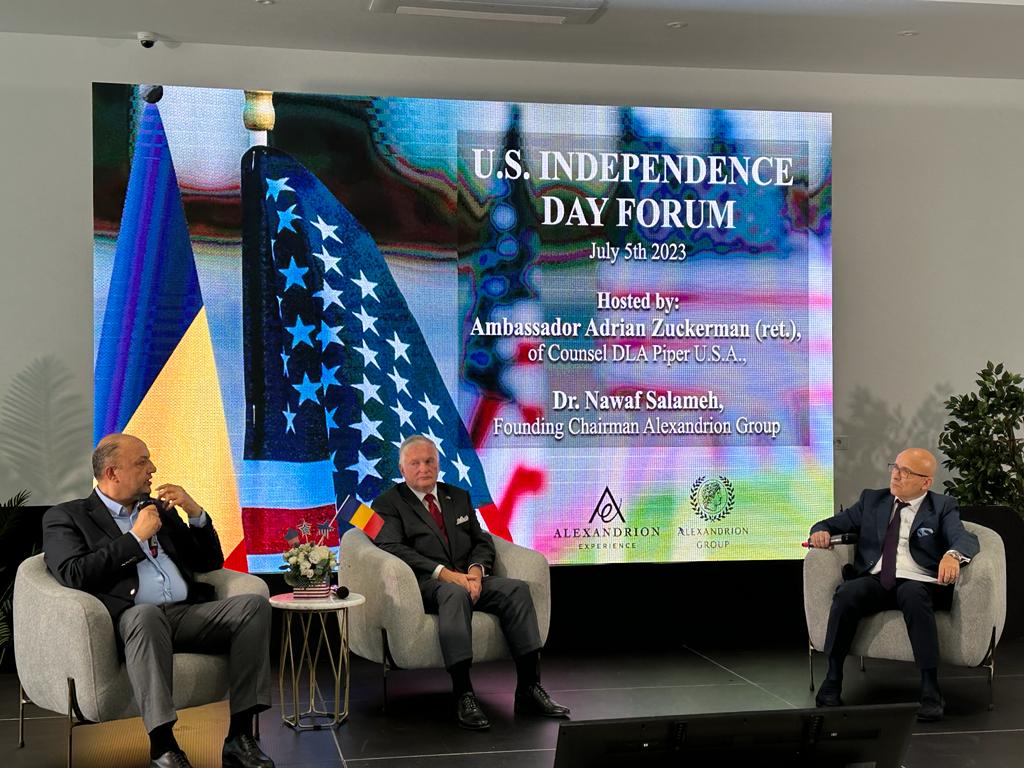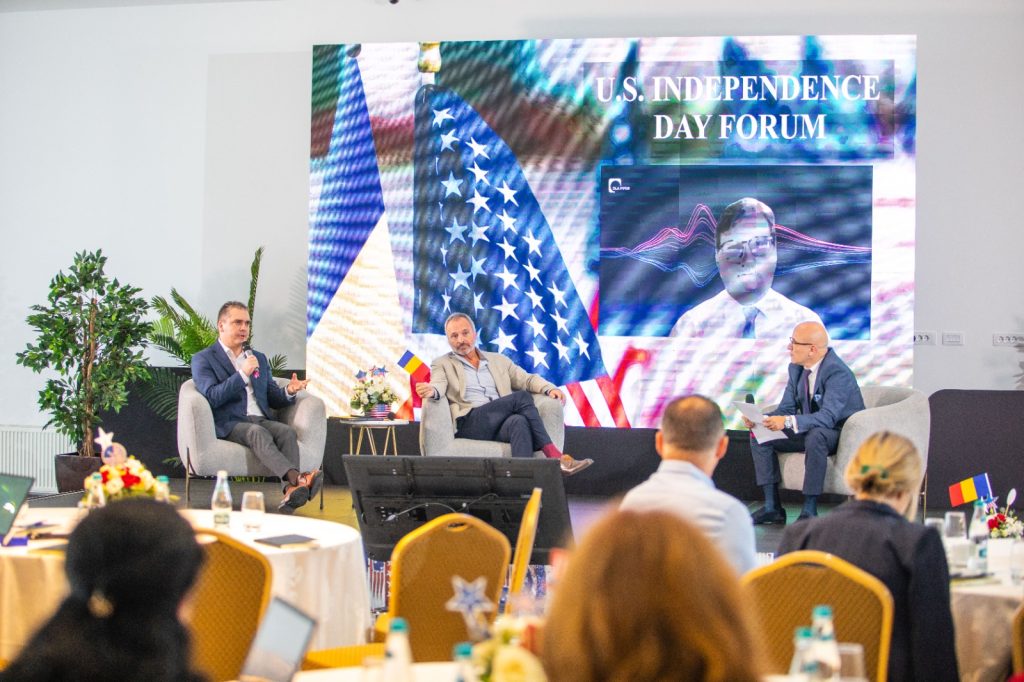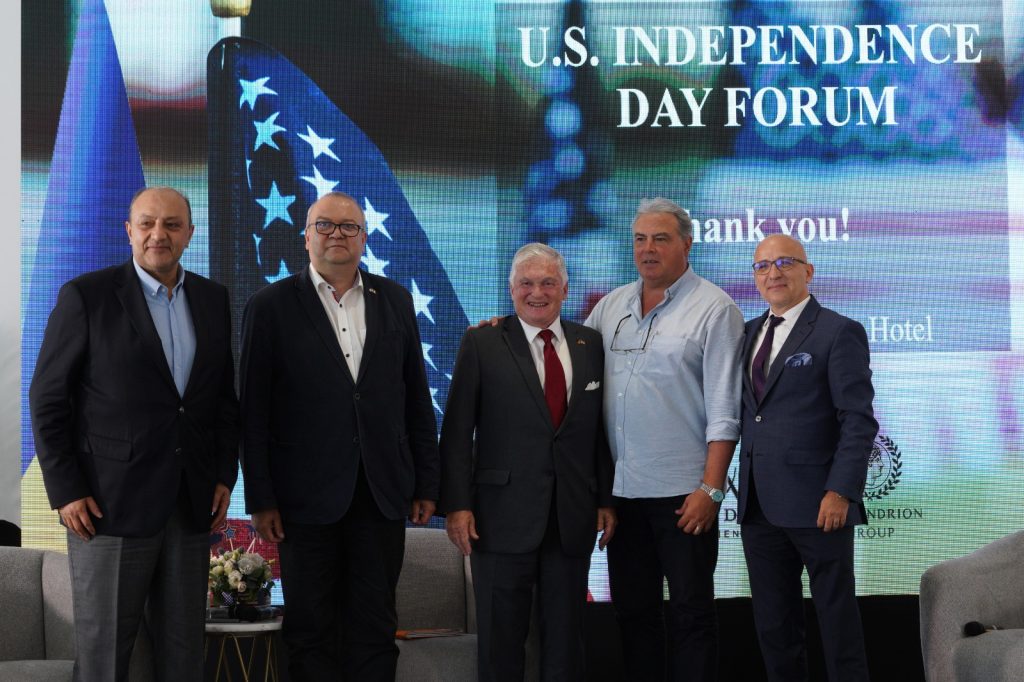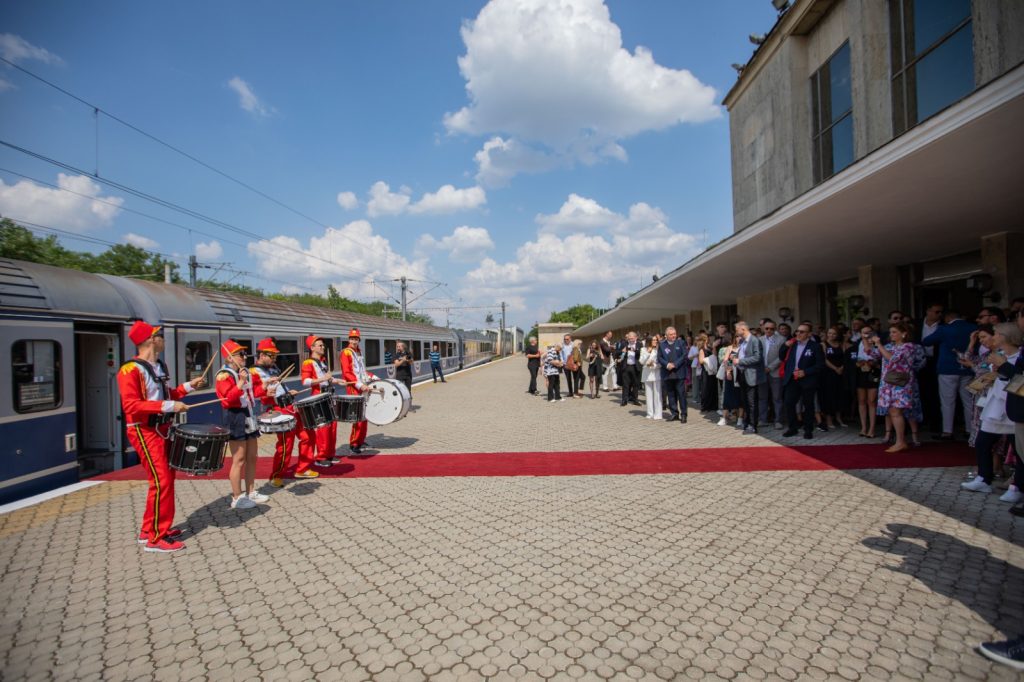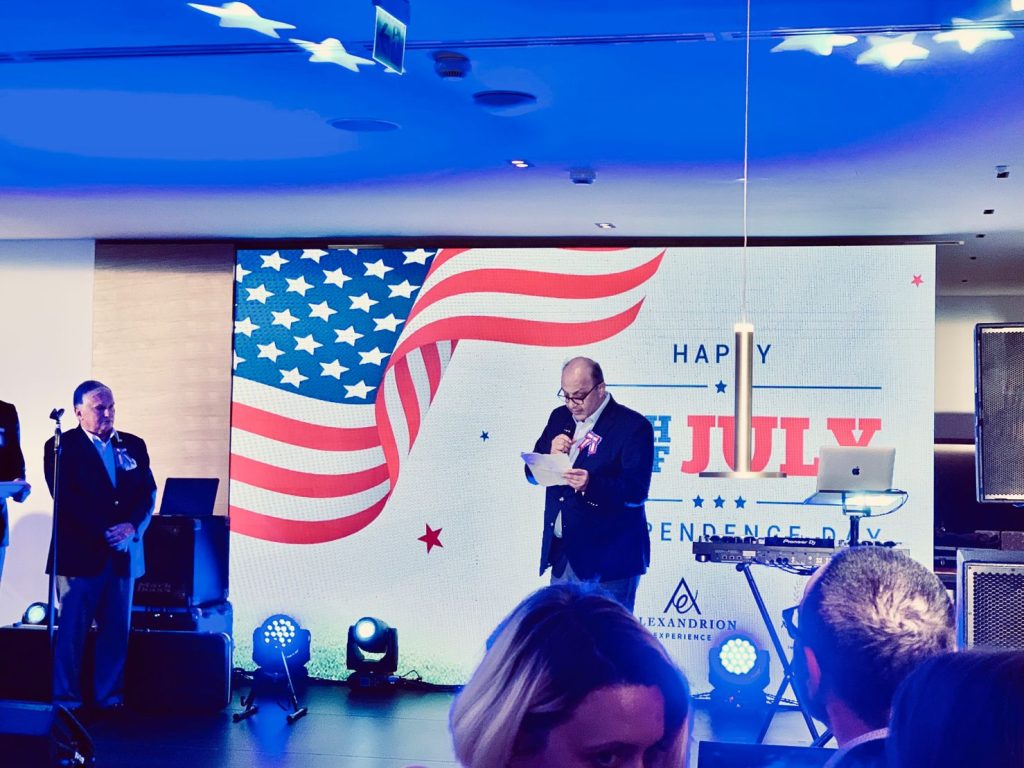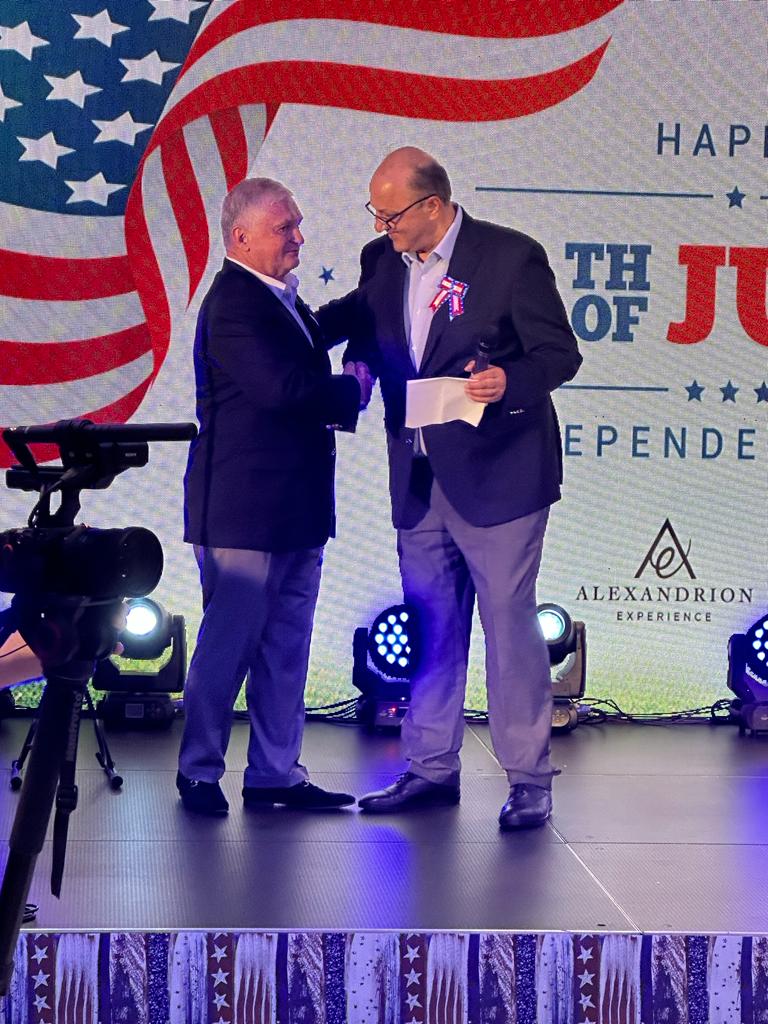Alexandrion Group, the largest producer and distributor of spirits and wines in Romania marked the U.S. Independence Day with a cocktail event organized on the evening of 4th of July, attended by representatives of diplomatic missions, business partners, media and public persons, followed by a conference on the 5th of July, on the new challenges of global economy and security in the Black Sea region. Both events were organized at the Alexandrion Experience Hotel in Sinaia, in partnership with Ambassador Adrian Zuckerman (ret.).
Through these events, which have started to become a tradition, Alexandrion Group aims to contribute to the long-term strategic partnership between Romania and the U.S.A.
The 4th of July cocktail event started with a unique train journey from Bucharest to the Alexandrion Experience Hotel in Sinaia. The guests were welcomed at the Royal Train Station and embarked on an adventure with elements specific to American culture and traditions. The train journey was designed to represent, at the same time, a metaphor of openness to a historical time and space characterized by values such as freedom of expression and action, tolerance and cultural diversity.
The evening continued at the Alexandrion Experience Hotel, where the guests were welcomed by Dr. Nawaf Salameh, Founding Chairman of Alexandrion Group and Ambassador Adrian Zuckerman (ret.), who spoke about the importance of maintaining and developing the relations between Romania and the U.S.A.
Dr. Nawaf Salameh said: “The Romanian people understood how important freedom is, they learnt to appreciate it at its true value after the tumultuous experience of communism that they went through and that I also lived for 8 years, after my arrival in Romania as an immigrant. The Romanians, just like the Americans, fought for their freedom, won it and now enjoy it and protect it very much even at global level. I am glad that today we managed to bring together Romanians, Americans and many other nationalities to celebrate freedom, peace and unity, very important values in which we all believe.”
Ambassador Adrian Zuckerman (ret.) emphasized: “America is a success because it is a free country and because its citizens compete in a meritocracy and are rewarded for their achievements. It is an honor for me to celebrate the 4th of July with all my Romanian friends – thank you all for joining us tonight. I would like to see Romania follow in America’s footsteps. Romania is one of the richest European countries in terms of natural resources and human capital. It can, thus, become an economic leader in Europe. Entrepreneurship and free markets have created widespread prosperity globally. Nawaf Salameh is the perfect example of this. God bless you, God bless Romania and the United States of America!”
Playing the anthems of Romania and the U.S.A was an emotional moment for everyone present. The guests enjoyed traditional American and Romanian dishes paired with spirits and flagship wines from the Alexandrion Group’s portfolio. The atmosphere was completed by international hits performed by Iulia Dumitrache band, saxophone music and several dancing numbers.
U.S. Independence Day Forum Conference
On July 5th, the “U.S. Independence Day Forum” a conference that brought into the spotlight the over 140 years of diplomatic relations between the U.S.A and Romania and the strategic partnership of over two decades between the two countries, took place. The conference had two panels, moderated by Sabin Orcan, the general director of Newsweek Romania.
The first panel “The challenges of global economy”, had the following speakers: Răzvan Mustață, Dean of the Faculty of Economy and Business Administration, Babeș-Bolyai University, Cluj-Napoca, Mark Beacom, CEO Black Sea Oil & Gas Romania and Craig Martin, International Head for Restructuring, DLA Piper.
The second panel, „A roadmap for the security in the Black Sea Region” was a debate during which the following speakers presented their views: T. Ulrich Brechbuhl, former Counselor of the US Department of State and Acting Undersecretary for Public Diplomacy, Adrian Cioroianu, former Minister of Foreign Affairs, Manager of the National Library of Romania and George Scutaru, CEO of New Strategy Center, former National Security Advisor to the Romanian President.
Ambassador Adrian Zuckerman (ret.) reminded in the opening of the conference that the U.S.A are Romania’s best friend and, along with Poland, represent one of the important states defending NATO’s eastern flank against the threat of Russia. “Romania is a defender of national and global security”, His Excellency also said. Ambassador Adrian Zuckerman (ret.) envisions a bright future for Romania from an economic point of view.
Dr. Nawaf Salameh said that it is very important for Romania to have economic connections at global level. He emphasized that, in the context of Russia’s invasion of Ukraine, international economic cooperation is very important.
“I think it would take me hours to explain the strong relationship between Romania and the U.S.A. The war between almost the whole world and Russia is an economic war. As an investor in Romania, where I emigrated about 40 years ago, but also an investor in the U.S.A for almost ten years, I believe that in order to attract American investors, we need to prepare Romania, improve the legislation, respect the rules and accept the mentality of the Americans, as it happens in other European countries, such as Poland, the Czech Republic, Slovenia, Slovakia, UK, Germany, in all the European countries in fact” said Dr. Nawaf Salameh.
Panel “The challenges of global economy”
Răzvan Mustaţă Dean of the Faculty of Economics and Business Administration, Babeș-Bolyai University, Cluj-Napoca: “The main economic challenges are related to inflation. We know that inflation is an economic phenomenon that is very challenging, that interferes with a lot of sectors. If we are going to make some comparisons with the stock exchange it is something similar: if a small event happens within the public area or with decision makers the stock markets will react. So, considering the war in Ukraine we have all the tension between the U.S.A. and China and all the aspects related to delivery of goods and everything in global economy. Right now we could say that the global reaction has improved. In the U.S.A. we see the decline of the inflation rate, which means that we expect this decline in other economies and particularly in Romania and in the European Union. But if we don’t challenge this phenomenon in a proper manner, we might face a high inflation rate and a lot of negative economic consequences.”
Mark Beacom, CEO Black Sea Oil & Gas Romania: “There are so many challenges to choose from, because my focus is energy, it is slightly different. We have this existential threat – global warming and what it is creating for the entire planet and so there is this real effort to get into transition economy, move away from fossil fuels. I am a fossil fuel guy but, I am fully aware that we need to move to something more sustainable. In the same time we have an energy security threat because of what has happened in the Ukraine and we saw economy move heaven and earth to try and store up their energy, because if you don`t have energy coming into your country everything collapses. In a transition period I fully believe we need natural gas and Romania has the nearer term and the long-term solution that also can benefit the economy, only Romania has this resource comparing to other countries that are starving for this benefit. So, I think energy is the problem, security and transition and Romania is sitting in a very positive position.”
Craig Martin, International Head for Restructuring, DLA Piper: “There are still parts of the world that are under conflict. We all know where many of those places are and I think that as Romania comes out of its past being under what we call the Iron Curtain emerges as a center of Europe as Europe shifts Eastward, part of what Romania will need to do is figure out how to fit into the global economy and how it wants to integrate and be part of that transition”.
Panel „A road map for the security in the Black Sea”
Adrian Cioroianu, former Minister of Foreign Affairs, Manager of the National Library of Romania: “There is always room for diplomacy in every conflict, especially considering the tremendous changes that have occurred in the Black Sea since 1990. Just imagine that during the Cold War, the Black Sea resembled a triangle, with the Soviet Union having two sides, the West and the East, while Turkey, a NATO member, held the Southern side. Today, NATO has two sides: the Northwestern side, potentially expanding from Ukraine in the future, and the Southern side with Turkey, which, in my opinion, is pivotal for our alliance.”
George Scutaru, CEO of New Strategy Center, former National Security Advisor to the Romanian President: “Romania is very close to the biggest threat to European security, and I believe that Romania plays one of the most important roles because it serves as a hub for supporting Ukraine. Currently, we are fulfilling this role, and I anticipate that Romania’s profile will face significant changes in the next decade. It is necessary to continuously develop the strategic partnership with the U.S.A. because the conflict in Ukraine is not only a dispute between two countries, Russia and Ukraine; rather, it is a battle between autocracy and democracy. I believe that Romania can play a crucial role due to our energy resources in the Black Sea. In the near future, I hope that Romania, especially with its gas reserves, can assume a significant role, including in the process of reconstructing Ukraine. Romania can serve as a bridge for American and Western companies to reach Ukraine, locating themselves here under the Article 5 umbrella, having direct access to energy resources, at lower costs, and participating in Ukraine’s reconstruction efforts”.
Ulrich Brechbuhl, former Counselor of the U.S. Department of State and Acting Undersecretary for Public Democracy, emphasized the importance that the U.S.A. remains a strong country plays in maintaining a free and democratic world. Additionally, establishing stronger partnerships, including with Romania, is a priority to strengthen the eastern flank. Recognizing the realistic global landscape, one of the reasons for the conflicts is the control and dependence on energy resources, with the solution in diversifying energy sources and avoiding over dependence on resources controlled by states that do not share common values such as democracy and freedom. The proposed solution involves building alternative resources and capabilities in Europe. Overall, it is crucial for Europe and the U.S.A. to collaborate and support each other in order to address the challenges of the modern world.
The conference was streamed online on the Social Media channels of the Alexandrion Group and is available here: https://www.youtube.com/watch?v=3EgEye173Dw
